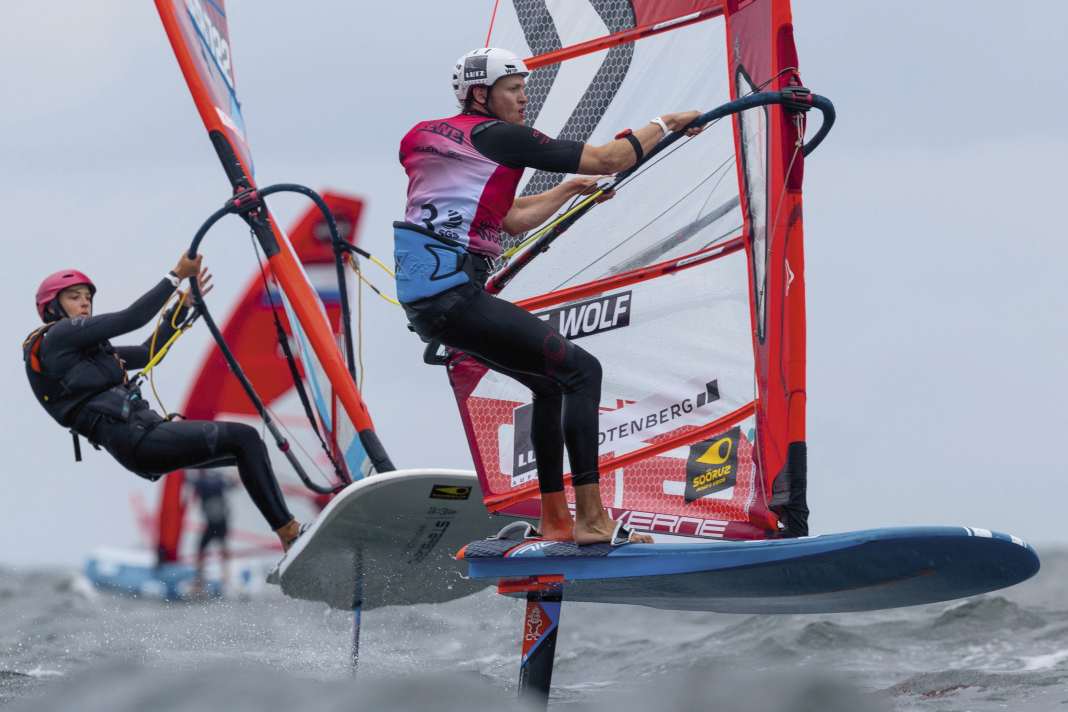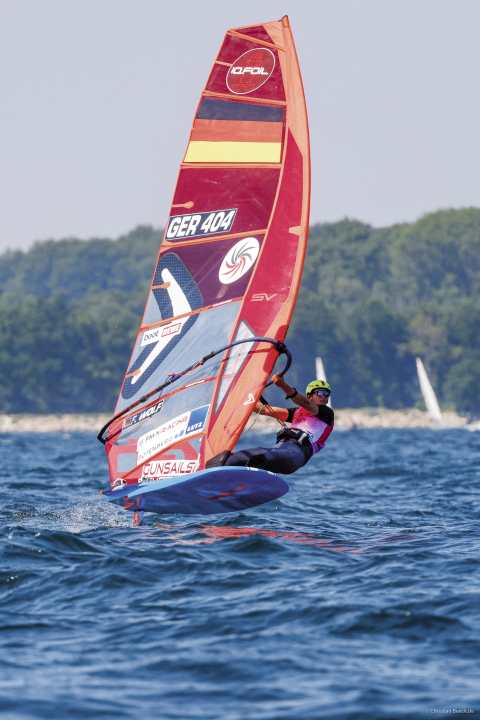iQFOiL: "I quickly realised that something was possible!" - Interview with Kiel Week winner Fabian Wolf
Andreas Erbe
· 30.06.2025




Fabi, congratulations on winning the iQFOiL regatta at Kiel Week. How did the success feel on your home turf?
Winning right on my doorstep in Kiel felt really good. For me, it was the first official iQFOiL race since the SOF Hyères Last Chance Regatta in April 2024 - so after quite a long break. I honestly didn't know exactly what to expect. Back then I was still sailing with the 9-m² sail, this time for the first time with the smaller 8-m² sail previously used in the women's class.
There was still a score to settle. I was mentally and health-wise ready to get going again!"
After the end of the national qualification for Paris 2024 (Marseille), I literally put my equipment in the corner - and didn't touch it again for almost a year. The turning point only came in April of this year, when I was coaching the next generation of iQFOil riders at a youth camp organised by Dennis Müller. I got back on the board there myself - and immediately realised that I still had unfinished business. I was mentally and health-wise ready to get going again. What many people might not realise: Over the past three years or so, health problems have repeatedly set me back. I've therefore used the last few months to get physically stable again - and have also squeezed in the odd slalom session in between, because the physical strain there is only a fraction of what is required in the iQFOiL.
Shortly afterwards, I really got back into training. It was exactly seven weeks of preparation before Kiel Week. And then to come back like this - that feels particularly good, of course. I realise that the absolute world leaders weren't at the start in Kiel. Nevertheless, I can realistically categorise the result and see it as a successful new start. Now I'll continue step by step - with the clear goal of working my way back up to the world's best.
Coming back like this - that feels particularly good, of course!"
When did you realise that you could ride at the front of the field?
When I saw the entry list in advance, my first goal was to make it into the top 8 and qualify for the medal race. I knew some of the names - so I knew that there were some fast people on the list. At the same time, I was curious to see how the young talents had developed since my last start. To be honest, I still didn't have an exact feeling of where I currently stood and what level I was at.
I realised pretty quickly that something was possible!"
Two days before the start of the regatta, I took part in a few practice races on site - and that's when I realised pretty quickly that something was possible! I was able to keep up, race at the front - and suddenly realised that I had the level to compete for victory here. That gave me a real boost. With this energy and a new goal in mind - to go for the win - I then started the races. I was able to stay consistently in the top 3 throughout the entire regatta and finally moved up to first place on the last day. That meant I qualified directly for the Grand Final in the Medal Race.
At this point, you will find external content that complements the article. You can display and hide it with a click.
Did the conditions with relatively strong winds suit you?
In fact, the conditions didn't suit me at all. My "feel-good wind range" is actually between 10 and 20 knots - I feel most competitive in these conditions. I knew in advance that I was still a bit behind in my training in both light winds and strong winds. But it was precisely these extremes that we had over the course of the week: on the first day of the race we had around 6 to 9 knots, and on the following days there were gusts of up to 30 knots. In hindsight, it was actually the perfect training - even if it was pretty demanding during the race. It wasn't until the Medal Race that we had conditions in the ideal range for me, i.e. 10 to 20 knots. However, the wind there was very unstable and shifty - which didn't make the whole thing any easier either. To summarise: The conditions were really anything but easy.
Many of my competitors regularly jumped up during the race to loosen the seaweed from the foil - I didn't dare to do that directly without a previous test."
Have there already been problems with seaweed?
Yes, definitely - in addition to the already challenging conditions, there was also the typical seaweed of the Baltic Sea. And there wasn't exactly a lot of it. In my opinion, the seaweed made many races unnecessarily difficult and unpredictable. Especially on the last downwind courses, I often lost positions because I couldn't find an effective way to get rid of it during the race. Many of my rivals regularly jumped up during the race to get the grass off the foil - I didn't dare to do that directly without testing beforehand. It wasn't until the medal race that I had no other choice. Then the situation was clear: all or nothing - so I did it.

What did you think of the new format for the medal races?
I have to say: the Medal Race was really hard to beat in terms of excitement. I was seeded for the final with a one-win lead, but then disaster struck - and suddenly I was on the verge of dropping to fourth place before the last start. That wouldn't have been possible in the old format, because only the top 3 start in the Grand Final - so a medal would have been an automatic certainty. In the current structure, everything remains open until the end, which creates additional drama. Both formats have their advantages and disadvantages.
In the long term, my clear goal is to concentrate fully on Olympic windsurfing again and make my way towards Los Angeles 2028."
What's next - are you going for the 2028 Olympics?
I plan to take part in several slalom and iQFOil regattas this year. I have set the iQFOil European Championships in Sicily at the end of November as my big target competition. I want to be at a level there that will allow me to compete and attack at the front. The World Championship in Aarhus is already scheduled for mid-July. I'll also be at the start there, but I see the event primarily as an opportunity to see where I stand. In view of the very short training time after my break, the World Championships are still a little early - but they are an important step to see where I stand and what I need to work on. In the long term, my clear goal is to concentrate fully on Olympic windsurfing again and make my way towards Los Angeles 2028. I realise that this will be a tough and challenging path - but I feel ready for it.
Andreas Erbe
Chief editor surf
Andreas was born in 1962 and grew up in Osnabrück. He became passionate about windsurfing as early as 1974, when he learned to tack and jibe at one of the first surf schools on the Baltic Sea. Lake Dümmer became the favorite playground of his youth for him and his friends. In 1988, he joined Surf Magazin as a tester and later editor and was lucky enough to be able to turn his passion into a career. Andreas has been responsible for the magazine's content as editor-in-chief since 2002. His favorite spots are those on the Danish North Sea and Baltic coasts.

